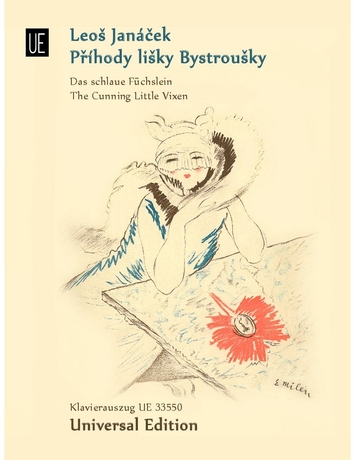

.jpg)
Leoš Janáček's opera The Cunning Little Vixen was premiered 100 years ago today (6 November 1924) at the National Theatre in Brno. This opera is a beautiful allegory of the life cycle, following a clever fox who escapes captivity to experience the wild. Janáček’s music captures the sounds of nature, from birds singing to rustling leaves, blending folk melodies with his unique compositional style. Initially dismissed as too simplistic, Das schlaue Füchslein was later celebrated for its deep philosophical insights and Janáček’s love for the natural world.
"The best way to bring a festival to a close is with a birthday party! Leoš Janáček already had his 170th in July and now it’s the turn of one of his famous operas. However, no-one would guess she was one hundred, as she still has an impish spark in her eye and fur the colour of autumn gold, but that’s the way it goes. Our vixen Bystrouška from the forests of Bílovice is celebrating her 100th birthday on 6 November 2024. Janáček’s Cunning Little Vixen is a production that’s not only associated with Brno but with our theatres in particular. It had its premiere at the Mahen Theatre 100 years ago, and it opened the newly built Janáček Theatre in 1965. The most recent production, directed by Jiří Heřman and conducted by Marko Ivanović, provided the gala opening for the Janáček festival in 2018, when the Janáček Theatre also reopened after reconstruction, and since then it has been a permanent fixture on our repertoire. It is enchanting, humorous, and filled with children and their toys, which playfully transform the Gamekeeper’s home into a forest and themselves into forest creatures. And we observe the hectic pace of life through the eyes of the ageing Gamekeeper. Each one of Janáček’s operas is unique and there is nothing else in the opera genre quite like The Cunning Little Vixen, where the lives of humans and animals intertwine on stage. Janáček was looking for a subject which would reflect his view of the world and the eternal cycle of life, which is why his Bystrouška dies at the hands of Harašta the poacher. But there’s another young Bystrouška here…life goes on. Janáček’s lyrical and melodic music confirms this, with the orchestra revelling in the colours of the Bílovice forests and the creatures that live there. All of this sparkles with humour and a touch of Janáček’s spiky nature, but mainly with kindness. As Janáček himself said: “I wrote it for the joy and sorrow of my later years.” - PATRICIE ČÁSTKOVÁ
